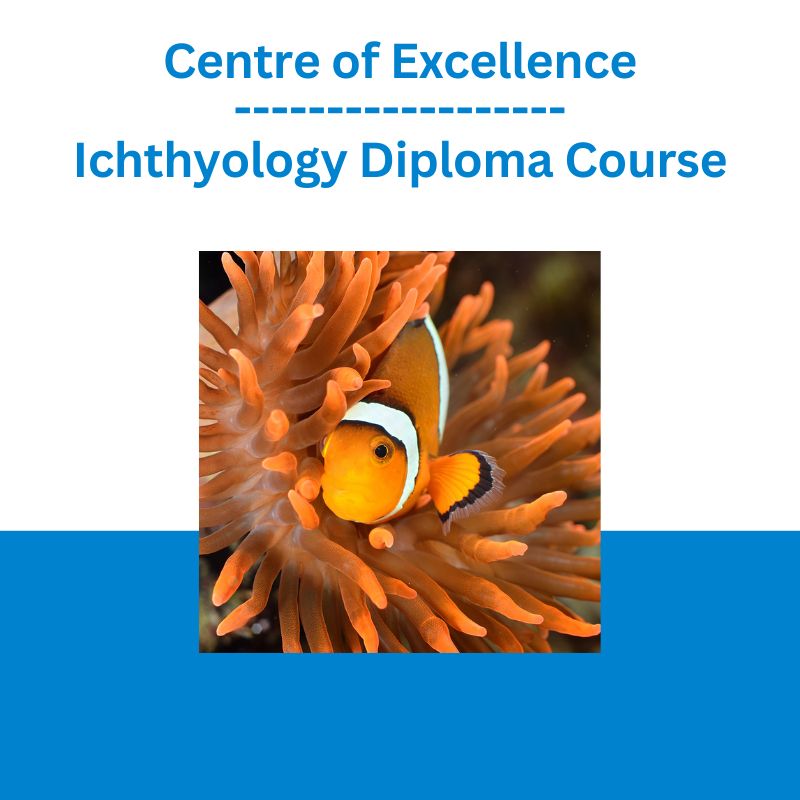*** Proof of Product ***
Exploring the Essential Features of “Centre of Excellence – Ichthyology Diploma Course”
What Will You Learn?
A broad field of science defined as the study of all things fish, ichthyology is a branch of zoology that studies vertebrate organisms with physiological structures like gills, scales, and who inhabit aquatic environments.
Studying the Ichthyology Diploma Course, you’ll learn about the various classifications, characteristics, and types of fish, how fisheries operate, and the ecological significance of fish and the impact that climate change is having on them.
The course begins with the basics of ichthyology – what fish are, where they live, and the properties of the water they inhabit. We’ll examine the evolutionary process of fish, the five classes into which they are divided, how to differentiate between different types, their morphological and physiological characteristics, and reproductive processes.
We’ll explore the effects of overfishing, the advantages and disadvantages of aquaculture, and statistical applications within fishery science. We’ll also examine the biological pump, the ecological significance of fish, how agents of climate change affect fish and anthropogenic influences on the environment.
By studying this course, you will:
- Learn about the various classifications, characteristics, and types of fish
- Be aware of the issues of overfishing and the application of statistics within fishery science
- Understand the ecological significance of fish and the impact that climate change is having on them
Course Syllabus
What will I learn on the course?
Module 1: Fish Distribution
8 parts
Introduction
Part 1: What is a Fish?
Part 2: Properties of Water
Part 3: Marine Biomes
Part 4: Freshwater Biomes
Test Your Knowledge
Key Learning Points Exercise
Module 1 Assessment
Module 2: Evolution
11 parts
Part 1: Evolution
Part 2: Natural Selection
Part 3: Classification
Part 4: Agnathan
Part 5: Chondrichthyes and Placoderms
Part 6: Acanthodii
Part 7: Osteichthyes
Part 8: Genetically Modified Fish
Test Your Knowledge
Key Learning Points Exercise
Module 2 Assessment
Module 3: Biodiversity
7 parts
Part 1: Latitudinal Variations
Part 2: Types of Fish
Part 3: Shape Diversity
Part 4: Longevity and Mortality
Test Your Knowledge
Key Learning Points Exercise
Module 3 Assessment
Module 4: Morphology
6 parts
Part 1: Size
Part 2: Anatomy
Part 3: Colour
Test Your Knowledge
Key Learning Points Exercise
Module 4 Assessment
Module 5: Physiology
10 parts
Part 1: Feeding Mechanisms
Part 2: Intelligence
Part 3: Vision
Part 4: Sounds
Part 5: Oxygen Consumption
Part 6: Locomotion
Part 7: Osmoregulation
Test Your Knowledge
Key Learning Points Exercise
Module 5 Assessment
Module 6: Reproduction
6 parts
Part 1: Sexual Variations and Mating
Part 2: Broods
Part 3: Fish Life Cycle
Test Your Knowledge
Key Learning Points Exercise
Module 6 Assessment
Module 7: Ecological Interactions
8 parts
Part 1: Energy and Environmental Exchange
Part 2: Food Webs
Part 3: Marine Trophic Interactions
Part 4: Ecological Exchange
Part 5: Environmental Significance
Test Your Knowledge
Key Learning Points Exercise
Module 7 Assessment
Module 8: Fisheries
7 parts
Part 1: Exploitation
Part 2: Effects of Overfishing
Part 3: Fishery Management
Part 4: Aquaculture
Test Your Knowledge
Key Learning Points Exercise
Module 8 Assessment
Module 9: Bayesian Statistics
6 parts
Part 1: Statistics
Part 2: Applications within Fishery Science
Part 3: Stock Assessments
Test Your Knowledge
Key Learning Points Exercise
Module 9 Assessment
Module 10: Climate Change
8 parts
Part 1: Climate
Part 2: Environmental Controls
Part 3: Anthropogenic Controls
Part 4: Combatting Climate Change
Conclusion
Test Your Knowledge
Key Learning Points Exercise
Module 10 Assessment
Who Would Benefit from This Course?
Whether you’re looking for an introduction to ichthyology with the intention of taking your studies further or would just like to gain a better understanding of the natural world, you’ll learn about fish of all varieties and their ecological role in Earth’s biomes.
Accreditations
The Ichthyology Diploma Course will take you up to 150 hours to complete, working from home. There is no time limit for completing this course, it can be studied in your own time at your own pace.
The Quality Licence Scheme is part of the Skills and Education Group, a charitable organisation that unites education and skills-orientated organisations that share similar values and objectives. With more than 100 years of collective experience, the Skills and Education Group’s strategic partnerships create opportunities to inform, influence and represent the wider education and skills sector.
The Skills and Education Group also includes two nationally recognised awarding organisations; Skills and Education Group Awards and Skills and Education Group Access. They are committed to helping employers, organisations and learners cultivate the relevant skills for learning, skills for employment, and skills for life.
Their knowledge and experience of working within the awarding sector enables them to work with training providers, through the Quality Licence Scheme, to help them develop high-quality courses and/or training programmes for the non-regulated market.
Please see the full list of alternative group-buy courses available here: https://lunacourse.com/shop/










 Greg Loehr - Advanced Option Trading With Broken Wing Butterflies
Greg Loehr - Advanced Option Trading With Broken Wing Butterflies